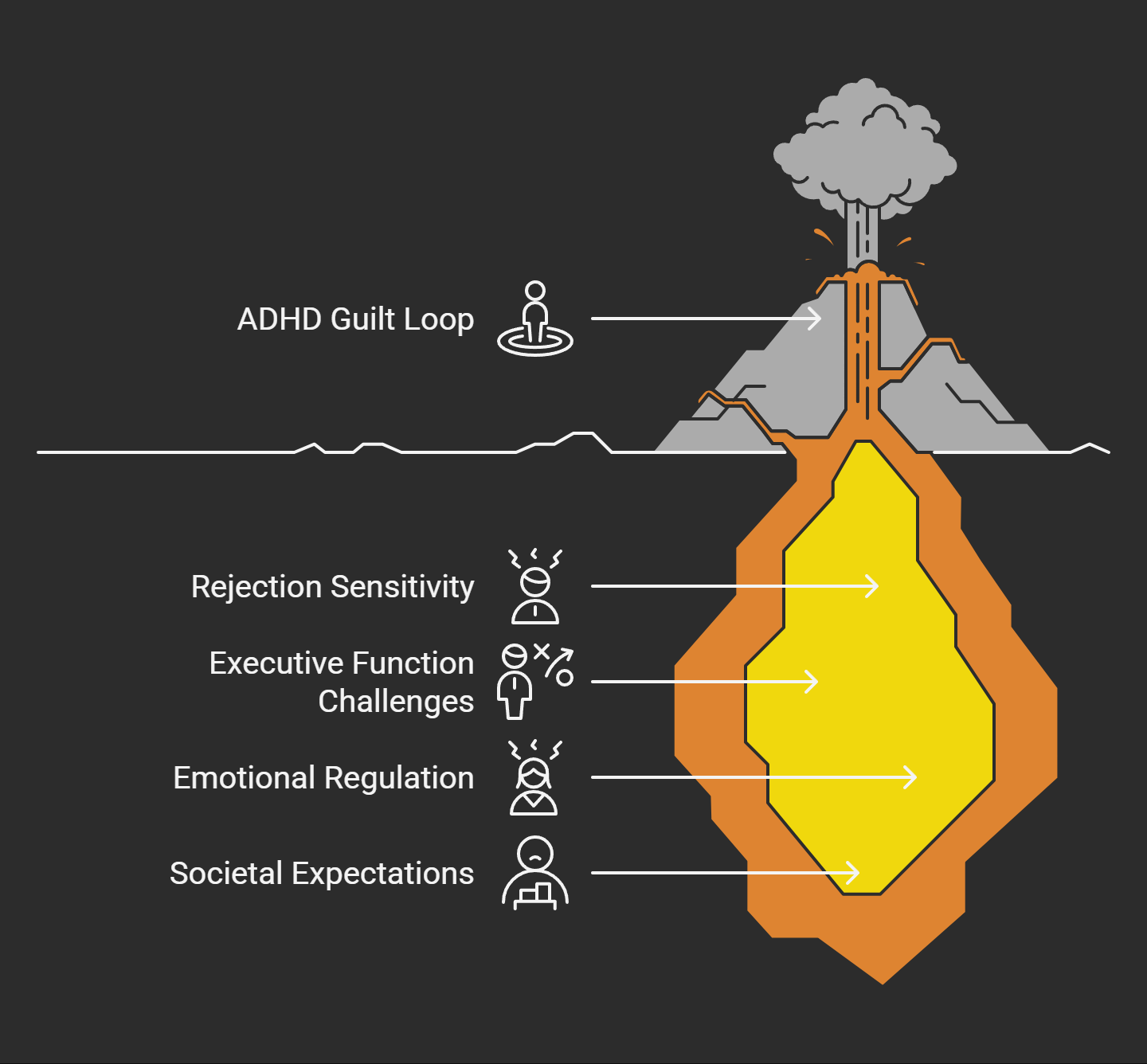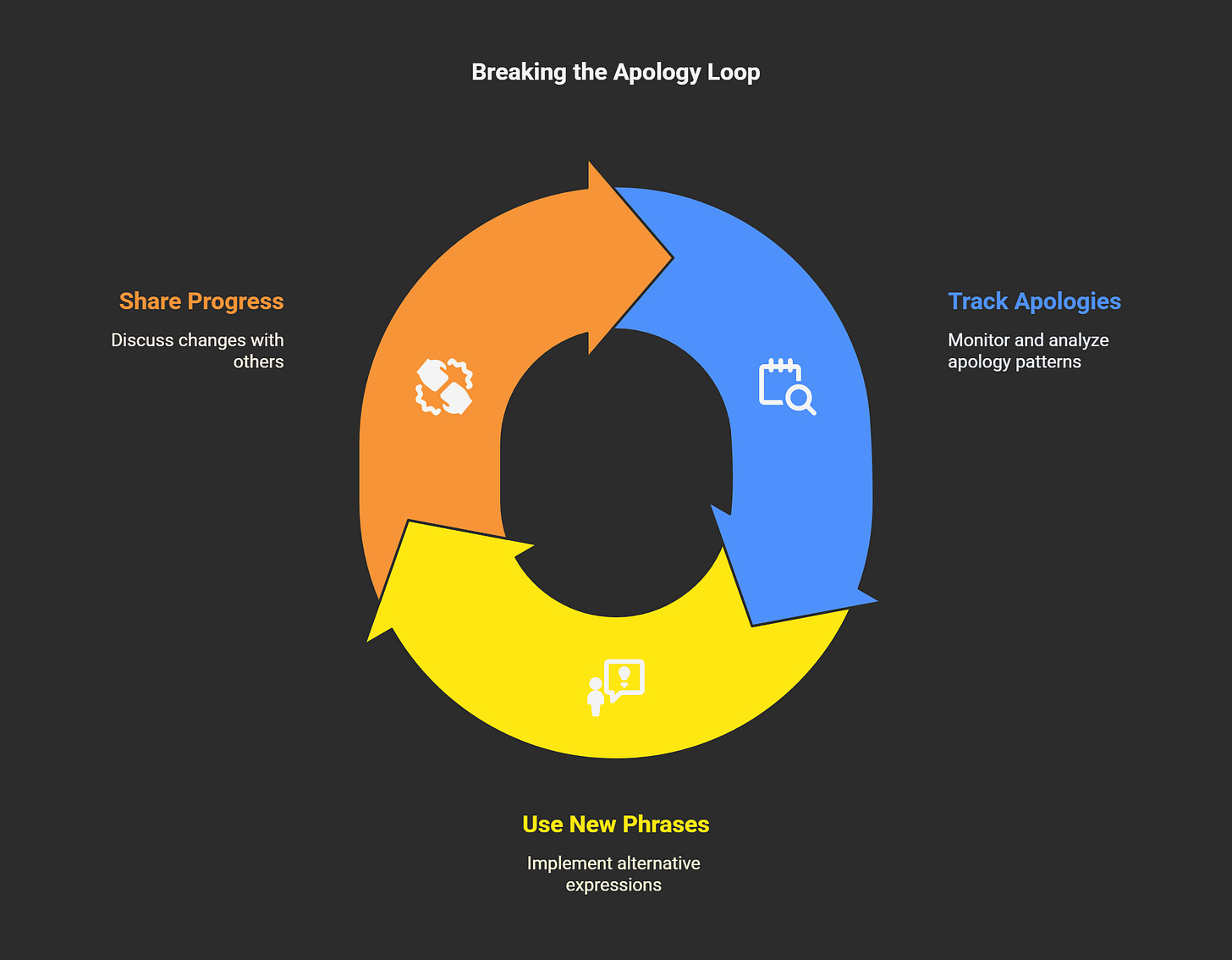🙏😬 Why ADHD Makes You Say Sorry All the Time - And How to Finally Stop
Break free from guilt loops, set boundaries without shame, and start owning your space with confidence. 💥🧠✨
🔥 "Sorry!" I said, squeezing past someone at the grocery store. Then again when I reached for the same bag of spinach. Then again when I bumped my own cart.
It wasn’t until I got home and counted, I had said “sorry” nine times during a five-minute shopping trip—that it hit me: I wasn’t apologizing for what I did… I was apologizing for existing.
Sound familiar? If you’re ADHD, you might feel like a walking apology machine. But why? What’s really behind all that guilt? Let’s break it down. 🧠👇
😔 The Hidden Guilt Loop
(and Why ADHD Fuels It)
People with ADHD often struggle with rejection sensitivity, executive function challenges and emotional regulation. This creates a loop of guilt and shame that fuels over-apologizing:
🔁 The ADHD Guilt Loop:
😵 You forget a text, miss a deadline or interrupt someone mid-sentence.
😞 You feel terrible and spiral into guilt.
😬 You over-apologize—even when it’s not needed.
💔 You start feeling ashamed, not for what you did, but for who you are.
🔄 You try to be “less much,” tone yourself down, or disappear… until the cycle repeats.
🧠 Why ADHD Makes This Worse (Science-Backed)
🧩 ADHD brains process social feedback and mistakes more intensely. Combine that with emotional dysregulation, and the result is a hyper-awareness of being “too much” or “not enough.”
🔬 Scientific Backing:
⚠️ ADHD brains have higher levels of rejection sensitivity. Berenson et al., 2010
🧠 The anterior cingulate cortex, tied to error detection, is more reactive. Bush et al., 2000
🧬 We experience stronger emotional pain in response to criticism or mistakes. Surman et al., 2013
🪫 Executive dysfunction makes it harder to track social cues and responses. Barkley, 2010
📉 How Chronic Apologizing Impacts ADHD Life
⚠️ It might seem harmless, but saying sorry all the time chips away at your confidence and boundaries.
🧍♀️ You minimize your presence to avoid being “a burden.”
💬 You weaken your words by always softening your stance.
💔 You reinforce shame-based identity: “I’m always messing up.”
❌ People may take advantage of your guilt reflex.
😓 You drain energy trying to manage everyone else’s comfort.
🎯 How to Break Free from Over-Apologizing (Without Becoming Rude)
Here’s what works for real, ADHD-style:
💡 Notice the Pattern
Start with awareness. Count how many times you say “sorry” in a day. Write them down.
🎭 Name the Emotion
What’s under the apology—guilt? Shame? Fear of rejection? Label it to tame it.
🛑 Replace Sorry with Something Stronger
Try these scripts:
“Thanks for waiting!” instead of “Sorry I’m late.”
“Good point? Let me add to that,” instead of “Sorry for interrupting.”
“I need a moment,” instead of “Sorry I’m overwhelmed.”
👯♀️ Practice with a Friend
Roleplay sticky moments and swap “sorry” for power statements.
📘 Read Tamara Rosier’s Book
📖 Your Brain's Not Broken by Dr. Tamara Rosier
She dives into how ADHD impacts emotion, motivation, and social dynamics—and what to do about it.
📲 Use ADHD-Friendly Tools
Try apps that support emotion tracking and boundaries like:
✍️ Cheat Sheet: Quick Fixes for ADHD Over-Apologizing
🌟 Quick swaps to build confidence:
🔹 Instead of “Sorry I forgot…” → “Thanks for the reminder.”
🔹 Instead of “Sorry I’m too much…” → “This is who I am.”
🔹 Instead of “Sorry I need help…” → “Could you support me with this?”
🔹 Instead of apologizing for boundaries → “I’m choosing what’s best for me.”
🔧 Extra ADHD-Friendly Strategies That Work
🧠 Body Doubling Confidence Boost
Talk through tricky social situations with a supportive buddy or coach before they happen.
🪞 Mirror Affirmations
Practice saying “I belong here” or “My voice matters” daily—even if it feels awkward at first.
📅 Script It Beforehand
Prepare responses for situations where you feel pressured to apologize.
💌 Write Your Wins
Track moments when you held a boundary or expressed yourself—proof that you’re growing.
🎯 Action Plan: Break the Cycle in 3 Steps
✅ Step 1: Track Your Apologies
Note when, why, and how often you say “sorry.” What’s the deeper emotion?
✅ Step 2: Try 2 New Phrases This Week
Pick two “non-sorry” phrases and test them in daily life.
✅ Step 3: Share the Journey
Tell a friend or ADHD group about the shift you’re making. It helps anchor the change.
🚀 Final Thought: You’re Not a Burden, You’re a Badass
You don’t owe the world an apology for existing.
Saying “sorry” constantly isn’t politeness, it’s a symptom of shame.
But now you see it. You get to shift it.
🧠 You’re allowed to take up space.
💬 You’re allowed to speak up.
💪 You’re allowed to say no.
And you’re allowed to stop apologizing for being ADHD YOU.
💬 Let me know what “sorry” are you letting go of this week?
📢 Share this with a friend who over-apologizes too.
👉 Follow for more ADHD insights + subscribe to ADHD Wisdom Tools for weekly tips!












“Saying “sorry” constantly isn’t politeness, it’s a symptom of shame.” - YES! Totally this. I’m in the U.K. & we do also all say sorry a lot so it’s a bit hard to tell what’s average, but I definitely apologise more than average for the cultural norm, and I’m often apologising for existing. Would be fascinating to do a speech audit somehow.. This is an area ripe for further research…